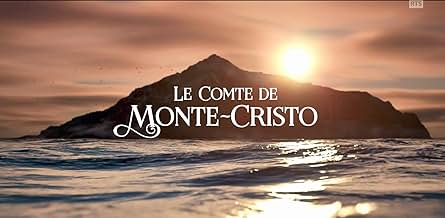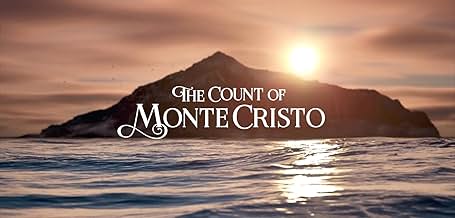Edmond Dantès, marino acusado falsamente de traición, es encarcelado en el castillo de If, frente a las costas de Marsella. Tras escapar y adoptar la identidad del Conde de Montecristo, plan... Leer todoEdmond Dantès, marino acusado falsamente de traición, es encarcelado en el castillo de If, frente a las costas de Marsella. Tras escapar y adoptar la identidad del Conde de Montecristo, planea vengarse de quienes le acusaron injustamente.Edmond Dantès, marino acusado falsamente de traición, es encarcelado en el castillo de If, frente a las costas de Marsella. Tras escapar y adoptar la identidad del Conde de Montecristo, planea vengarse de quienes le acusaron injustamente.
- Premios
- 1 nominación en total
Explorar episodios
Reseñas destacadas
By far the best adaptation of Monte C and closest to the book. Compared to French version this one is superior. Almost 90% is true to the book, the rest is light modifications, some good, some not very smart...
Lacks the intensity of the stories in the book. Maybe one or two more episodes would give time develop all characters correctly!
Everything was covered, a lot of details, good cinematography, but a lot is left unsaid... Few characters were merged, and used poorly, but I gave it a high rating, because other adaptations did not even try to follow the book.
Solid adaptation of a great book!
Everything was covered, a lot of details, good cinematography, but a lot is left unsaid... Few characters were merged, and used poorly, but I gave it a high rating, because other adaptations did not even try to follow the book.
Solid adaptation of a great book!
I've been a fan of The Count of Monte Cristo since reading the book years ago, but I've struggled to find an adaptation that truly worked for me.
The films are too short to do the story justice, and while the popular 1998 French-Italian miniseries had its charm, it feels a bit dated now and takes some liberties with the plot.
I was actually anticipating the new 2024 French film adaptation when this English TV series appeared out of nowhere (though it is still a French-Italian production).
This series is the best adaptation I've seen so far. After watching it, I can confidently say I'm less excited about the film (although three hours long, it probably still not long enough to include all story elements).
It's been a long time since I read the book and I don't remember every detail, but the series seems faithful to the story and the eight episodes give the plot room to develop. It simplifies some secondary character and story arcs, but overall, it covers much of the novel.
My only critique is that the middle episodes did get a bit convoluted, and I sometimes struggled to keep track of the three families. (To be fair, I'm terrible with names, which didn't help.)
Regardless, I highly recommend this series, whether or not you're a fan of the book. My wife, who hasn't read it, loved the series just as much-and even asked to keep watching, which is rare for her.
The films are too short to do the story justice, and while the popular 1998 French-Italian miniseries had its charm, it feels a bit dated now and takes some liberties with the plot.
I was actually anticipating the new 2024 French film adaptation when this English TV series appeared out of nowhere (though it is still a French-Italian production).
This series is the best adaptation I've seen so far. After watching it, I can confidently say I'm less excited about the film (although three hours long, it probably still not long enough to include all story elements).
It's been a long time since I read the book and I don't remember every detail, but the series seems faithful to the story and the eight episodes give the plot room to develop. It simplifies some secondary character and story arcs, but overall, it covers much of the novel.
My only critique is that the middle episodes did get a bit convoluted, and I sometimes struggled to keep track of the three families. (To be fair, I'm terrible with names, which didn't help.)
Regardless, I highly recommend this series, whether or not you're a fan of the book. My wife, who hasn't read it, loved the series just as much-and even asked to keep watching, which is rare for her.
Out of ALL of the versions of this wonderful tale of abstract revenge; this series happens to be the most wonderful of all. Although it lacks the action of the predecessors, it is the CLOSEST adaptation to the novel. This series encompasses the majority of the book and in such, it should be deemed as a must watch be any and everyone that loves this novel. This adaptation shows all aspects of the angst of the protagonist. In Edmond Dantes, you can see that he struggles with doing what his heart desires as revenge but nonetheless he goes forward even in his one on one interactions with Mercedes, he still goes forward. Dumas would have LOVED this rendition.
In a landscape filled with adaptations that often only capture a shadow of their source material, "The Count of Monte Cristo" miniseries arrives as a resounding triumph-a television event that not only honors but elevates its origins. This isn't just another version of Alexandre Dumas's story; it is, without a doubt, the definitive adaptation for our generation and one of the best I have ever had the pleasure of watching. A flawless masterpiece that deserves every second of your attention and the highest possible rating.
At the heart of this magnificent production lies the performance of a lifetime from Sam Claflin, who delivers an unforgettable Edmond Dantès/Count of Monte Cristo. His portrayal is, without exaggeration, hypnotic and masterful. We watch with bated breath as he transitions from the naive young sailor, his eyes brimming with hope, to the cold, calculating, and relentless Count, whose pain and thirst for revenge burn behind a facade of charisma and absolute control. The camera masterfully captures every micro-expression, revealing the layers of a man remade by tragedy and knowledge.
The brilliantly crafted screenplay achieves the rare feat of being extremely faithful to the soul of the book. The eight-episode miniseries format was the perfect choice, allowing the complex plot to unfold with the necessary pace and depth. Essential characters like Maximilien Morrel, Valentine de Villefort, and even the bandit Luigi Vampa-so often cut from other versions-are given their due prominence here, enriching the narrative and showing a profound respect for Dumas's work. The few changes made only serve to enhance the story's cohesion, making it even more believable and impactful on screen.
Visually, the series is a cinematic spectacle. Every scene is a painting, with stunning cinematography, authentic costumes, and spectacular locations that transport us directly to 19th-century France. From the desolation of the Château d'If to the opulence of Parisian salons, every detail is meticulously crafted, creating an immersive experience and a true feast for the eyes. The original score perfectly complements the atmosphere, intensifying every moment of tension and drama.
The supporting cast is equally brilliant. Jeremy Irons delivers a wise and captivating Abbé Faria, and his chemistry with Claflin makes their time in prison one of the series' high points. The villains are magnificently portrayed, with a palpable evil that makes the Count's revenge all the more satisfying. Characters like Jacopo and the series' version of Caderousse bring humor and humanity, balancing the story's tone.
"The Count of Monte Cristo" is television at its finest. It is a series that captivates from the first second to the last-an epic journey of betrayal, redemption, and one of the most well-orchestrated vengeances in literature. In the end, the feeling is not just one of satisfaction, but of gratitude for the creation of such a powerful and respectful adaptation. For fans of the book and newcomers alike, this is a must-watch experience and the perfect justification for a 10/10 rating. Simply marvelous.
At the heart of this magnificent production lies the performance of a lifetime from Sam Claflin, who delivers an unforgettable Edmond Dantès/Count of Monte Cristo. His portrayal is, without exaggeration, hypnotic and masterful. We watch with bated breath as he transitions from the naive young sailor, his eyes brimming with hope, to the cold, calculating, and relentless Count, whose pain and thirst for revenge burn behind a facade of charisma and absolute control. The camera masterfully captures every micro-expression, revealing the layers of a man remade by tragedy and knowledge.
The brilliantly crafted screenplay achieves the rare feat of being extremely faithful to the soul of the book. The eight-episode miniseries format was the perfect choice, allowing the complex plot to unfold with the necessary pace and depth. Essential characters like Maximilien Morrel, Valentine de Villefort, and even the bandit Luigi Vampa-so often cut from other versions-are given their due prominence here, enriching the narrative and showing a profound respect for Dumas's work. The few changes made only serve to enhance the story's cohesion, making it even more believable and impactful on screen.
Visually, the series is a cinematic spectacle. Every scene is a painting, with stunning cinematography, authentic costumes, and spectacular locations that transport us directly to 19th-century France. From the desolation of the Château d'If to the opulence of Parisian salons, every detail is meticulously crafted, creating an immersive experience and a true feast for the eyes. The original score perfectly complements the atmosphere, intensifying every moment of tension and drama.
The supporting cast is equally brilliant. Jeremy Irons delivers a wise and captivating Abbé Faria, and his chemistry with Claflin makes their time in prison one of the series' high points. The villains are magnificently portrayed, with a palpable evil that makes the Count's revenge all the more satisfying. Characters like Jacopo and the series' version of Caderousse bring humor and humanity, balancing the story's tone.
"The Count of Monte Cristo" is television at its finest. It is a series that captivates from the first second to the last-an epic journey of betrayal, redemption, and one of the most well-orchestrated vengeances in literature. In the end, the feeling is not just one of satisfaction, but of gratitude for the creation of such a powerful and respectful adaptation. For fans of the book and newcomers alike, this is a must-watch experience and the perfect justification for a 10/10 rating. Simply marvelous.
This is one of the greatest of revenge tales. Even Lew Wallace borrowed from "The Count of Monte Cristo" when he wrote "Ben-Hur" around 40 years after "Monte Cristo" was first published.
A few reviewers on here take issue with how this veers off from the book and don't give it a high rating for that reason. Every adaptation of "Monte Cristo" veers off from the book. That has to happen because the multi-faceted revenge story is complex and wasn't meant to be watched, just read. This veers off in ways that enhance the theme of this story.
This series is a great watch. We couldn't stop. We wanted to know what he was going to do next. And because there was so much irony, many scenes were surprisingly funny as Dantes' victims fell into his web.
Sam Claflin was detached, pained, clever, single-minded and charismatic, credibly portraying everything that Dantes needed to be to pull off his revenge.
A few reviewers on here take issue with how this veers off from the book and don't give it a high rating for that reason. Every adaptation of "Monte Cristo" veers off from the book. That has to happen because the multi-faceted revenge story is complex and wasn't meant to be watched, just read. This veers off in ways that enhance the theme of this story.
This series is a great watch. We couldn't stop. We wanted to know what he was going to do next. And because there was so much irony, many scenes were surprisingly funny as Dantes' victims fell into his web.
Sam Claflin was detached, pained, clever, single-minded and charismatic, credibly portraying everything that Dantes needed to be to pull off his revenge.
¿Sabías que...?
- CuriosidadesIn the book the Count of Montecristo made occasional use of a hashish paste. While this is never explicitly stated in the series, several times the Count can be seen eating the content of a small vial.
- PifiasAction inside the prison takes place from 1815, but Edmond and Faria use metric. Napoleon abandoned the system in 1812 (after extensive public protest), and it wasn't brought back until 1840.
- ConexionesVersion of The Count of Monte Cristo (1908)
Selecciones populares
Inicia sesión para calificar y añadir a tu lista para recibir recomendaciones personalizadas
Detalles
- Color
- Relación de aspecto
- 1:2
Contribuir a esta página
Sugerir un cambio o añadir el contenido que falta































